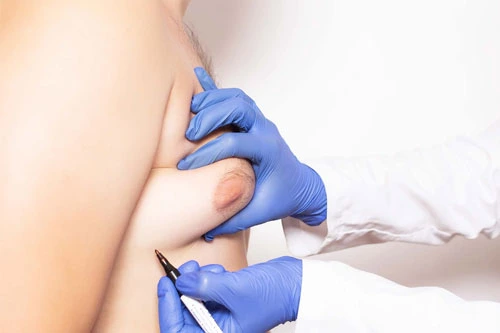Introduction
Navigating the journey of gynecomastia surgery can be a complex process, laden with both emotional and physical considerations. Effective communication with your surgeon is pivotal in ensuring a successful outcome. This detailed guide is designed to help you understand the nuances of this communication process, preparing you thoroughly for your surgery.
Understanding Gynecomastia and Its Surgical Treatment
Defining Gynecomastia
A comprehensive explanation of gynecomastia, addressing its medical definition, the physiological reasons behind its occurrence, and its potential psychological impacts. This section will delve into how hormonal imbalances, lifestyle factors, or specific medications can lead to the development of gynecomastia.
The Surgical Approach to Gynecomastia
A detailed description of the surgical procedures typically used to treat gynecomastia. This will include a breakdown of techniques such as liposuction, excision methods, or a combination of both, and what patients can typically expect in terms of results and recovery.
The Role of Communication in Surgical Success
Building a Trust-Based Relationship
Elaborating on the importance of establishing a trusting and transparent relationship with your surgeon. This section will discuss how open communication contributes to a successful surgery, ensuring that both patient and surgeon are aligned in terms of expectations and goals.
Ensuring Personalized Surgical Plans
Discussion on the importance of individualized surgical plans. This part will explore how effective communication with your surgeon can lead to a treatment plan that is specifically tailored to your needs, body type, and desired outcomes.
Preparing for Your Consultation
Conducting Preliminary Research
Guidance on how to conduct thorough research before your consultation. Tips will include what reliable sources to consult, understanding different surgical options, and being aware of the latest advancements in gynecomastia treatment.
Questions and Concerns to Address
A comprehensive list of potential questions and concerns that you might want to bring to your surgeon’s attention. This will include queries about the surgeon’s experience, details of the procedure, recovery expectations, and any potential risks or complications.
Maximizing the Consultation Experience
Communicating Your Health History
The significance of providing a complete and honest health history, including past medical treatments, current medication regimes, and lifestyle habits that could impact your surgery or recovery.
Discussing Your Surgical Expectations
A deeper dive into how to effectively discuss your expectations and the desired outcomes of the surgery. This will include understanding the limitations of the surgery, the variability in results, and setting realistic goals.
Risks, Recovery, and Realities
Understanding Surgical Risks
An extensive examination of the potential risks and complications associated with gynecomastia surgery. This section will discuss common side effects as well as rare but serious complications, and how to weigh these risks against the potential benefits.
The Recovery Process
A detailed walkthrough of the post-operative recovery process, including typical timelines for healing, care for surgical sites, and guidelines for resuming daily activities and exercise.
Decision Making and Informed Consent
Making an Informed Surgical Decision
How to utilize the information provided during consultations to make an informed decision about undergoing gynecomastia surgery. This includes understanding the procedure in detail, weighing its pros and cons, and aligning it with personal health goals.
The Consent Process Explained
A detailed explanation of the informed consent process, including what the consent form entails and the significance of fully understanding all aspects of the form before signing.
Emotional and Mental Well-being
Managing Emotional and Mental Health
Strategies for addressing any emotional or mental health concerns related to the surgery. This section will cover common emotional responses to gynecomastia and its treatment, and when it might be appropriate to seek support from a mental health professional.
Support Systems and Resources
Information on finding support systems, including counseling services, support groups, and online forums that can provide guidance and reassurance throughout the surgical journey.
Financial Planning and Insurance Considerations
Understanding the Costs
An in-depth analysis of the costs associated with gynecomastia surgery, including how these costs are calculated and what patients can typically expect to pay. This will also cover the financial impact of the surgery, including any potential hidden costs.
Navigating Payment and Insurance
Advice on handling the financial aspects of surgery, such as exploring payment options, understanding what is and isn’t covered by insurance, and tips for financial planning to afford the surgery.
Conclusion
A comprehensive summary of the key points covered in the guide, reaffirming the importance of effective communication with your surgeon in the lead-up to gynecomastia surgery. The conclusion will emphasize the role of being well-informed and prepared in ensuring a positive surgical experience and outcome.
FAQs
Q: How long after gynecomastia surgery can I return to normal activities?
A: Recovery time varies depending on the individual and the extent of the surgery. Generally, patients can return to work and light activities within a week, but should avoid strenuous exercise for at least 3-4 weeks. Your surgeon will provide a personalized recovery plan based on your specific circumstances.
Q: Are the results of gynecomastia surgery permanent?
A: The results of gynecomastia surgery are generally long-lasting, especially if post-surgical instructions are followed diligently. However, significant weight gain, steroid use, or certain medical conditions can affect the surgery’s longevity. Maintaining a stable weight and healthy lifestyle can help sustain the results.



